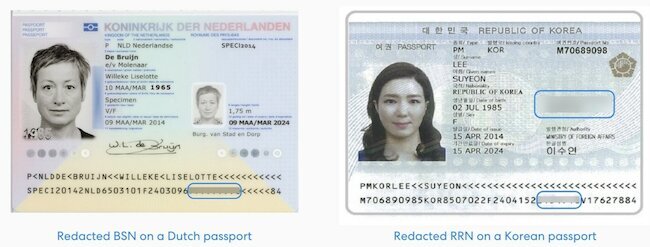ComplyCube Field Redaction removes sensitive fields from documents
ComplyCube enhanced its Document Checks solution with automated Field Redaction capabilities.

This feature systematically masks sensitive Personal Identifiable Information (PII) fields, such as the Dutch BSN, to assist businesses with global data privacy regulations compliance while maintaining their frictionless user experience.
Based on a study conducted by Deloitte, 71% of businesses forecast a tightening of data protection regulations in the upcoming year. Given the escalating concerns surrounding sensitive data, it’s becoming evident that organizations need to move beyond traditional encryption strategies and embrace advanced methods like redaction to ensure full compliance.
Examples of sensitive fields that can be redacted include, but are not limited to:
- Dutch Burgerservicenummer (BSN) or Dutch Citizen Service Number
- Singaporean National Registration Identity Card Number (NRIC)
- Korean Resident Registration Number (RRN)
The National Registration Identity Card is the official ID for Singapore’s residents and citizens. It contains sensitive personal data, including financial and criminal records. Each person has a unique nine-digit NRIC Number, essential for many services, such as opening a new bank account.
Similarly, the Dutch BSN is a distinct personal identifier designed to facilitate interactions between Dutch citizens and their government. When a business onboards customers, the process can be slower as the user must manually hide these sensitive identifiers.
Sensitive field redaction harmonizes the tension between preserving individual privacy and meeting global compliance mandates. While the Dutch “Wet bescherming persoonsgegevens” (Wbp) and France’s “Loi Informatique et Libertés” prioritize citizen data protection, entities such as FINRA and MiFID require comprehensive record-keeping. Redacting sensitive data allows businesses to keep essential records without infringing on privacy rights, bridging the gap between privacy and compliance.
The AI-powered verification platform says that snapshots of documents automatically undergo field redaction and data masking upon capture. Any instances of the fields, even those embedded in QR codes, are removed from the document. This includes areas such as the Visual Inspection Zone (VIZ), Machine Readable Zone (MRZ), and barcodes. For more granular data controls, businesses can customize their own field masking policies.
“In our commitment to user experience and compliance,” remarks Mohamed Alsalehi, the CTO of ComplyCube, “we’ve ensured that sensitive fields are neither stored nor processed by ComplyCube. This approach not only improves the UX but also simplifies customer onboarding, all while strictly adhering to prevailing privacy regulations.” During Document Check processing, any redacted text will be blurred out from the images across the API, Web Portal, and reports.
“Catering to our clients’ diverse needs is paramount,” stated Tarek Nechma, CEO of ComplyCube. “Our Premium and Enterprise Plans offer enhanced customization options, empowering subscribers to seamlessly integrate additional fields into their redaction policy. Our dedicated Support and Account Management teams stand ready to assist in tailoring these strategies, ensuring compliance remains both robust and flexible.”
ComplyCube’s update to its Document Checks solution comes off the back of the recent Document Liveness enhancement, marking yet another significant stride in their ongoing commitment to bolstering user privacy and efficiency. The Software as a Service (SaaS) company boasts that partner businesses can now expect an even more streamlined and secure experience.